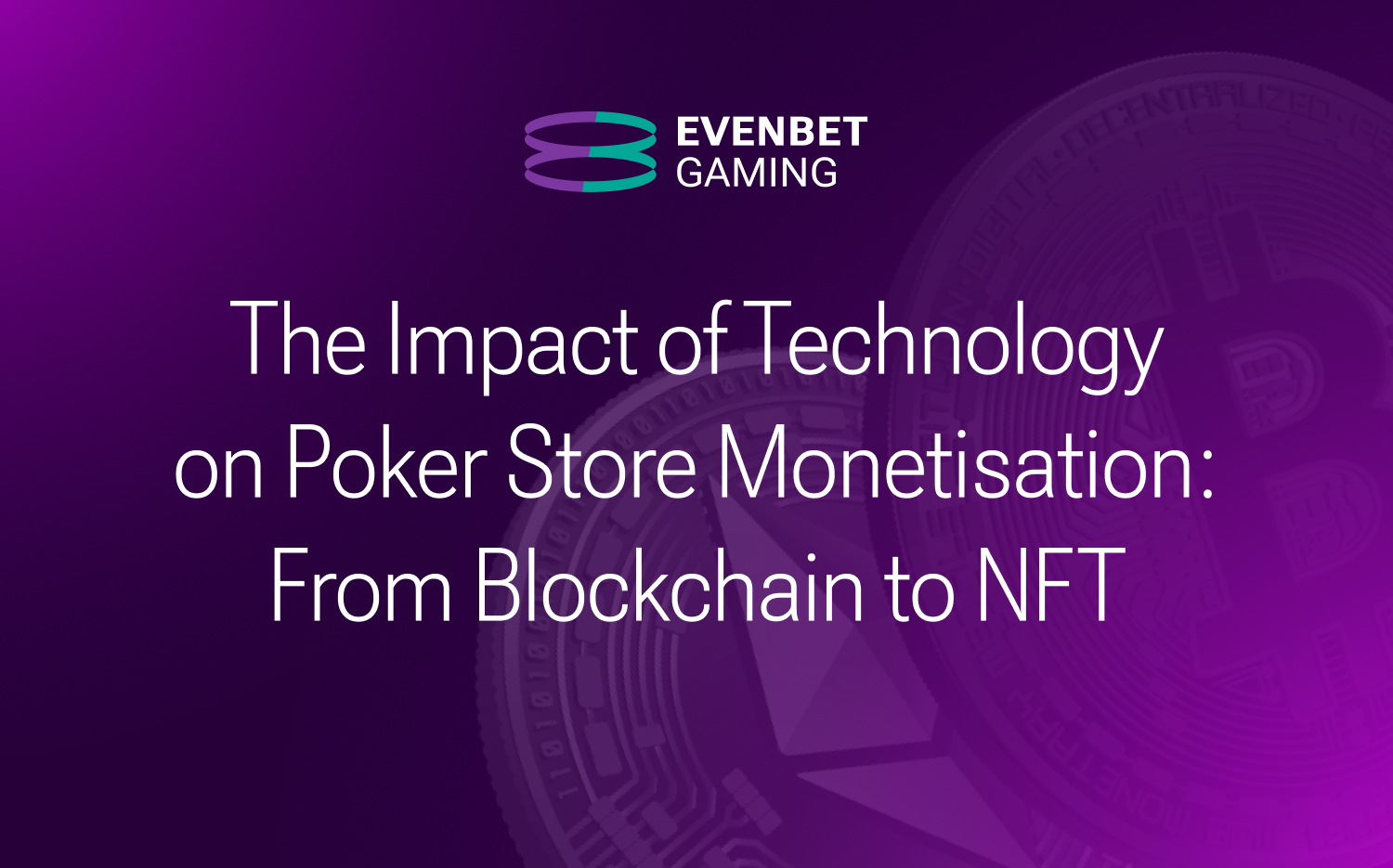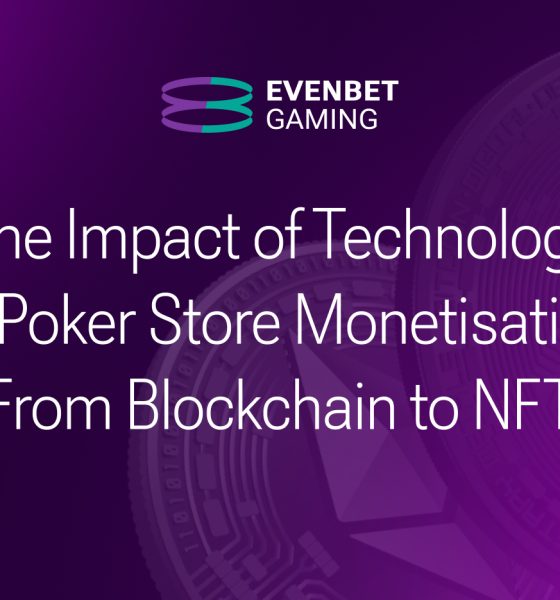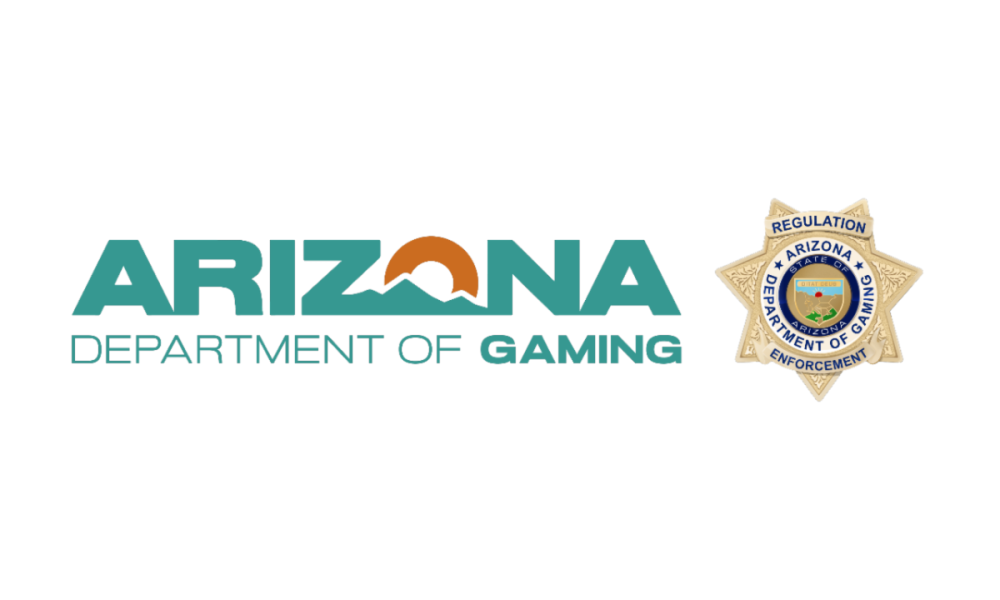

Latest News
The Impact of Technology on Poker Store Monetisation: From Blockchain to NFT
Over the years, poker has moved from once dim backrooms of dull backstreets to high‑stakes online arenas, and every step of the way, it was propelled by innovation. Today, it comes in the shape of blockchain technology with decentralised ledgers, unique NFT assets, and crypto wallets that allow for frictionless and borderless payments. These are more than fashion or flashy new tech, these novelties reshape the whole iGaming industry and fundamentally change how platforms monetise, how players engage, and how trust is built in online poker.
At EvenBet Gaming, we keep our ear to the ground and add blockchain‑ready features to our platform. In the following sections, we’ll explore traditional monetisation, introduce EvenBet’s enhanced toolkit, unpack the tech behind blockchain and NFTs, and examine the security, benefits and challenges operators face in this new era.
Traditional Poker Monetisation Models
We have already delved into the traditional poker monetisation streams in some of our previous articles, but let us recap. Online poker platforms have historically relied on a handful of core revenue streams:
- Rake: a small percentage (typically 2–5 %) taken from each pot, it forms the main share of operator income.
- Entry fees: tournament buy‑ins charged to participants, part of the fee is allocated to prizes and part to the house.
- Freemium models: the core gameplay is free with additional paid chips, cosmetic items, or power‑ups.
- In‑game purchases: sale of virtual goods — avatars, card backs, table themes — via traditional payment gateways.
- Ads and sponsorships: brand partnerships and in‑client advertising generate additional income.
While reliable, these methods depend on centralised control, fee structures, and limited player ownership. EvenBet’s research shows that poker clubs where players purchase in‑app chips via a virtual store have grown rapidly in markets where real‑money poker is restricted (in Asia, for example). In club models, app owners set purchase prices and incentives, while club and union owners manage tournaments and liquidity — this illustrates the power of microtransactions in generating revenue.
EvenBet’s Enhanced Monetization Offering
EvenBet Gaming offers more than traditional monetisation models, but fresh integrated features designed to boost ARPU and engagement across both real‑money and social poker formats.
In‑Store Feature
Our In‑Store offers bundles (Play Money chips, Time Bank top‑ups, VIP Card upgrades) that generate an ongoing microtransaction revenue stream alongside the traditional rake. The store, rolled out for free‑to‑play environments, also unlocks casual boosters to monetise play‑money sessions and encourage demo‑to‑real‑money conversion.
Soft Gaming Options
Soft gaming titles like slots, lotteries, or bingo keep players engaged between hands. These casual games monetise through timed bonuses, in‑game purchases, and promotional bundles, thus extending session length and spend in non‑real‑money modes.
Cross‑Vertical Upsells
Operators can diversify revenues by cross‑selling casino games and sports betting to poker users within the same client. Such a cross‑vertical strategy increases wallet share and overall ARPU because it allows for capturing spend across several iGaming verticals.
Clubs Feature
Earn via chip‑commission models (~30 %) and upsells like custom emoji packs or stats bundles. Platform owners set the prices for in-app chip bundles, VIP cards, and optional features (e.g., Rabbit Hunting, advanced statistics). All revenue from these sales flows directly to the platform, allowing operators to optimize pricing and promotions for their community.
Dealer Tips
Our Dealer Tips feature replicates real‑casino etiquette, and players can now tip the virtual dealer. This microtransaction heightens immersion (particularly in tipping cultures) and also unlocks another revenue stream.
Blockchain, NFTs, and Crypto Wallets in iGaming
Blockchain is a decentralised ledger that records transactions across distributed nodes. This guarantees that the data is immutable and transparent. Key benefits for poker operators include provably fair gaming (because players can audit RNG and shuffle algorithms to verify fairness), immutable records (tamper‑proof logs of bets and game actions allow for better dispute resolution), and secure funds (because irreversible transactions reduce the likelihood of fraud).
Non‑Fungible Tokens (NFTs) are unique on‑chain assets representing, and in poker, they can represent anything from avatars to tournament tickets. EvenBet’s platform supports NFT avatars, table‑income sharing, and tournament segmentation via NFT ownership. This, in turn, opens the way for:
- Secondary markets: players trade NFTs outside the poker platform, creating ongoing royalty streams for operators.
- True ownership: verifiable asset provenance and scarcity, which is in the very nature of an NFT, increase perceived value.
- Cross‑platform utility: an NFT can be used across multiple games and platforms.
Integrating crypto wallets into a poker platform gives players self‑custody of funds and assets. Crypto, which is becoming increasingly popular among players, allows for near‑instantaneous peer‑to‑peer deposits or withdrawals, more privacy thanks to its anonymity, and a seamless user experience thanks to removing reliance on third‑party payment processors. Making the most of this tech, EvenBet’s Crypto Poker integrates 140+ cryptocurrencies and multiple processors, enabling instant, low‑fee deposits and withdrawals. This attracts privacy‑focused and crypto‑native audiences, opening fresh monetisation channels.
New Monetisation Models Emerging from Blockchain Technology
Blockchain technology has unlocked several new ways of monetising an online poker platform, while offering transparency and security for players and operators who benefit from distributed ledgers and decentralised payments.
Play-to-earn dynamics: players can now earn cryptocurrency or NFTs simply by participating in games or tournaments. This turns traditional gameplay into a game of achievements with real-world value. The rewards often come in the form of token incentives or collectible assets, which can be traded on open marketplaces for profit.
NFT-driven marketplaces: non-fungible tokens are unique in-game items such as custom card designs, avatars, or VIP passes that players can buy, sell, or even auction both on the poker platform and outside. Limited-edition NFT collectibles introduce the idea of scarcity, which drives more demand, as well as brings more profit for the operator (both as an initial sale and in the form of royalties when resold).
DeFi and token staking: decentralised finance (DeFi) mechanisms allow poker platforms to incorporate staking models, where players lock tokens into smart contracts in exchange for passive returns or exclusive tournament entries. This provides operators with profits from protocol fees and also promotes long-term engagement because stakers earn rewards proportional to their commitment.
Decentralised poker ecosystems: smart-contract-driven poker platforms remove intermediaries and allow for peer-to-peer wagering and trustless game enforcement. Transaction fees collected on each hand and staking become key monetisation drivers in this new setting.
Security and transaction efficiency: crypto wallets integrated into poker clients make room for near-instant deposits and withdrawals with minimal fees. This leaves traditional payment methods far behind, as crypto reduces operational costs for both operators and players. Moreover, immutable blockchain records ensure provably fair shuffles and transparent gameplay, which is always good for trust.
Enhanced loyalty and ownership: blockchain tokens and NFTs can become the new backbone of poker loyalty programmes. They grant holders governance rights (voting on tournament formats or prize structures) and exclusive access to VIP events. This on-chain loyalty deepens community engagement, as players feel a tangible stake in the platform’s success.
Final Thoughts
The poker store of tomorrow isn’t just a menu of chips or avatars — it’s a tokenised marketplace, a community‑driven ecosystem, and a player‑owned economy. The new technology, such as blockchain, NFTs, and crypto wallets, is already shaping the new online poker reality. They are not a flashy new feature to attract the more tech-savvy players, but the new benchmark of the industry. These technologies bring about more transparency and security, alongside low‑fee payments and real asset ownership, all opening more revenue streams for poker platform operators. EvenBet Gaming’s modernised monetisation features, including the In‑Store Feature, Clubs, cross‑vertical upsells, Dealer Tips, and Crypto Poker — equip operators to capitalise on these trends.
Latest News
Arizona Department of Gaming and Arizona Lottery Announce Proclamation Recognizing September 2025 as Responsible Gaming Education Month

State agencies join forces to raise awareness, promote prevention, and provide tools for safe and responsible play.
The Arizona Department of Gaming (ADG) and the Arizona Lottery are proud to announce a joint effort in support of a new Proclamation recognizing September 2025 as Responsible Gaming Education Month in Arizona.
Responsible gaming is about ensuring that individuals who choose to play have the tools, resources, and knowledge they need to make informed decisions and enjoy gaming as a form of entertainment. While problem gambling initiatives focus on helping those already experiencing harm from gambling, responsible gaming emphasizes prevention by encouraging healthy play behaviors before they reach a critical point.
Throughout September, and continuing in the months ahead, the ADG and Arizona Lottery will work together to strengthen education and awareness initiatives. The goal is to equip players with strategies and resources that help them keep gaming fun and safe, while helping reduce the risks associated with problem gambling.
“For over 30 years, the Arizona Department of Gaming has safeguarded the integrity of gaming through strong consumer protections, enforcement against illegal operators, and support services for those impacted by problem gambling,” said Jackie Johnson, Arizona Department of Gaming Agency Director. “During Responsible Gaming Education Month, we remind everyone that part of playing responsibly is being informed—always double-check before you place your bet to ensure you are using a legal, regulated operator at gaming.az.gov/checkyourbet.”
The Arizona Lottery also remains steadfast in its commitment to responsible play and has a Level 2 certification with the World Lottery Association for responsible gaming. Lottery games benefit the people of Arizona by generating critical revenue that funds education, healthcare, environmental conservation, and economic development. At the same time, the Lottery prioritizes the well-being of its players. Each ticket includes clear odds of winning, vending machines display game odds, and the 1-800-NEXT-STEP helpline is featured across Lottery products and advertising.
“We are proud to deliver entertainment that benefits communities across our state, while recognizing our responsibility to promote safe play,” said Alec Thomson, Arizona Lottery Executive Director. “Through transparency and awareness, we want every player to have the tools they need to make informed decisions and enjoy the Lottery responsibly.”
As Arizona observes Responsible Gaming Education Month, ADG and the Arizona Lottery encourage all players to stay informed, know their limits, and seek help if needed. Together, we can ensure that gaming remains a source of entertainment that strengthens, rather than harms, Arizona communities.
For more information and resources, visit gaming.az.gov/ResponsibleGaming or ArizonaLottery.com/ResponsibleGaming. If you or someone you know may be struggling with problem gambling, call or text 1-800-NEXT-STEP for confidential support available 24/7.
The post Arizona Department of Gaming and Arizona Lottery Announce Proclamation Recognizing September 2025 as Responsible Gaming Education Month appeared first on Gaming and Gambling Industry in the Americas.
Canada
absolutebet Secures AGCO Registration as an Internet Gaming Operator in Ontario

Internet Gaming Operator by the Alcohol and Gaming Commission of Ontario (AGCO).
This significant milestone authorizes absolutebet to offer regulated iGaming services in Ontario’s legal market under the oversight of AGCO and iGaming Ontario (iGO).
The registration marks a key step in absolutebet’s mission to bring a trusted, responsible, and innovative online casino experience to Ontario players. absolutebet is committed to operating with integrity and transparency, meeting all provincial standards for player protection, responsible gambling, anti-money laundering, and game integrity.
“Securing AGCO registration is more than a milestone—it’s the start of absolutebet’s journey in one of the most exciting regulated markets in the world,” said Chen Truman, Founder of absolutebet. “We are building a brand that will grow with the Ontario community and set the stage for future expansion.”
On the regulatory milestone, Krisztina Kalla, Legal & Regulatory Compliance Advisor of absolutebet, commented: “I’m incredibly proud to see all the hard work behind this license pay off. Securing AGCO registration has taken months of preparation and close collaboration with regulators and partners. I am very happy to see the result of that work, and even more excited as we move into the launch phase and open up the absolutebet community to Ontario players in a fun and responsible way.”
Ontario is recognized as one of the most competitive and fast-growing regulated iGaming markets in North America. With AGCO registration secured, absolutebet will move forward with the final stages of its iGO onboarding process in preparation for launch.
The post absolutebet Secures AGCO Registration as an Internet Gaming Operator in Ontario appeared first on Gaming and Gambling Industry in the Americas.
Latest News
VeliTech Appoints Mats Lundin as Chief Sales Officer

Seasoned iGaming executive brings decade of commercial expertise to drive B2B growth
VeliTech, the B2B technology division of Veli Group, today announced the appointment of Mats Lundin as Chief Sales Officer (CSO). Lundin brings over 10 years of commercial leadership experience across the iGaming sector to accelerate VeliTech expansion as operators worldwide seek battle-tested platform solutions.
In his new role, Lundin will spearhead VeliTech global sales strategy, focusing on delivering the company’s comprehensive suite of iGaming solutions to operators seeking proven technology backed by real-world performance. His appointment reinforces VeliTech commitment to partnering with operators who demand more than promises – they want technology that is already winning in the market.
“Mats embodies the kind of proven expertise that our operator partners expect,” said Giorgi Aleksidze, CEO at VeliTech.
“His track record of building meaningful relationships and driving revenue growth aligns perfectly with our approach of backing our technology with real results. When we say we bet on our tech, we need leaders who understand what that means in practice.”
Lundin joins VeliTech from Vegangster, where he served as Sales Manager. His career spans key roles including Director of Sales and Chief Commercial Officer at Gaming Corps, Head of Sales at iSoftBet, and various commercial positions where he consistently delivered revenue growth and market expansion
“What drew me to VeliTech is their unique position in the market,” said Lundin.
“This is not just another platform provider making bold claims – this is a team that operates their own gaming brands and proves their technology works where it matters most. That combination of technical excellence and real-world validation creates compelling value for operators.”
Throughout his career, Lundin has specialised in provider and operator relationship management, regulatory navigation, and market analysis. His expertise spans both B2B and B2C sectors, with a proven ability to identify growth opportunities and translate them into sustainable commercial success.
The VeliTech platforms cover all critical aspects of iGaming, including player account management, no-code CRM, payment gateway, content aggregation, and game development. The appointment of Lundin as CSO comes as the company continues expanding its presence across regulated markets, from European casinos to emerging African markets.
The post VeliTech Appoints Mats Lundin as Chief Sales Officer appeared first on European Gaming Industry News.
-

 gaming3 years ago
gaming3 years agoODIN by 4Players: Immersive, state-of-the-art in-game audio launches into the next generation of gaming
-
EEG iGaming Directory8 years ago
iSoftBet continues to grow with new release Forest Mania
-
News7 years ago
Softbroke collaborates with Asia Live Tech for the expansion of the service line in the igaming market
-
News7 years ago
Super Bowl LIII: NFL Fans Can Bet on the #1 Sportsbook Review Site Betting-Super-Bowl.com, Providing Free Unbiased and Trusted News, Picks and Predictions
-
iGaming Industry8 years ago
Rick Meitzler appointed to the Indian Gaming Magazine Advisory Board for 2018
-
News7 years ago
REVEALED: Top eSports players set to earn $3.2 million in 2019
-
iGaming Industry8 years ago
French Senator raises Loot Boxes to France’s Gambling Regulator
-
News7 years ago
Exclusive Interview with Miklos Handa (Founder of the email marketing solutions, “MailMike.net”), speaker at Vienna International Gaming Expo 2018






